Top Meta execs to face grilling in social media probe
A senior Meta official says a total news ban on Facebook remains “on the table,” with current government legislation “unworkable”.
Social
Don't miss out on the headlines from Social. Followed categories will be added to My News.
Senior Meta executives say the option to block news on Facebook and Instagram in Australia remains an option, after being hauled back before a government inquiry for an update on the threat.
The Albanese government has said it is considering using laws under the News Media Bargaining Code to force Meta into negotiating with news publishers or risk fines or hits to its Australian revenue.
The social media giant has already said it would stop paying media companies to use content on its ‘news’ tab, in what is a $70m-a-year to the industry.
Meta’s regional director of policy Mia Garlick said Meta – which owns Facebook and Instagram – had not received further engagement from the federal government over the issue.
However, she said the current “unworkable” legislation was not “reflective of the economic realities of news on our services”.
“All options are on the table, but as I indicated, we haven’t had any indication about which way things are progressing and so there’s nothing further to update,” she said.
“That is clearly one of the options that is on the table but there’s no sort of clear indication of the direction at this stage.”
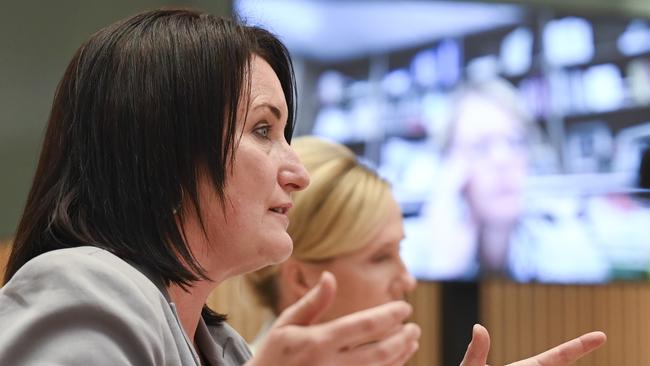
Ms Garlick said no government ministers or Prime Minister Anthony Albanese had met with Meta chief executive Mark Zuckerberg.
However, assistant treasurer Stephen Jones – who is responsible for negotiating the deal – had met with Meta’s vice president for public policy for APAC Simon Milner in February, eight months ago.
Ms Garlick also admitted previous figures that news content only made up 3 per cent of newsfeed was a figure based on US data, however, she said she had “no reason to believe that the situation is different in Australia”.
Independent member Zoe Daniel accused Meta of using US data and calling the government to “rely on an assumption that the US data extrapolates to the Australian situation”.
“So you’re asking us to rely on, in effect, two non-answers,” said Ms Daniel.
While Ms Garlick maintained the data was backed up with Australian specific data points, Ms Daniels was dissatisfied with the answer.
“I think we need some more rigorous or substantive information on this to place trust in that number of 3 per cent and I don’t have a lot of faith in it, in the way that it’s been framed,” she said.
WHO DECIDED TO END THE NEWS BARGAINING DEAL?
Committee chair Sharon Claydon also had a testy exchange with Ms Garlick over who, or which department, had decided to end the deal to pay publishers for news content.
Ms Garlick said it was the decision of a “cross functional team” and said it would have involved members from the “product leadership team in partnership with the board of leadership”.
She confirmed a similar process was used when Meta decided to ban news on Facebook in Canada.
However Ms Claydon was unimpressed with the answer.
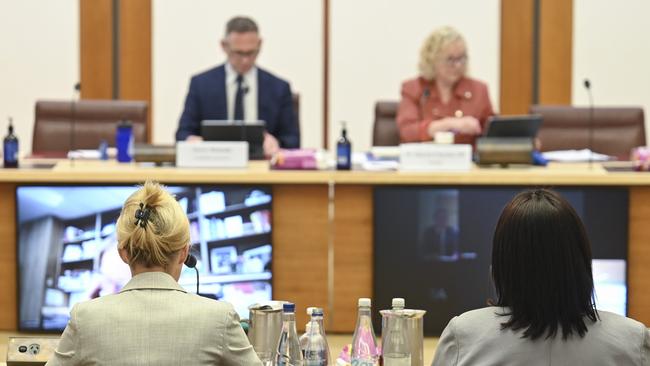
“It’s a pretty big decision. And it’s one that has profound indications here in Australia and so I remain stunned and it is almost beyond belief that there isn’t an answer to these questions,” she said.
“Are you just making decisions based on commercial decisions, or do you regard your social responsibility to be a good global citizen as part of that decision making process?” she said.
“It’s very difficult to see how you are factoring in your responsibilities or obligations to be a good global citizen if none of those players (like the CEO or board) are even involved?
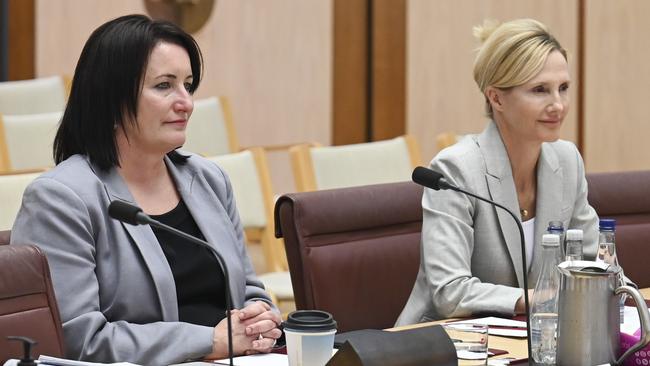
META CALLS FOR APP LAW FOR UNDER 16s
Meta’s vice president and global head of safety says Australia should implement laws which would force parents to approve what apps children under the age of 16 download.
Speaking to the parliamentary inquiry into the effects of social media and Australian society, Meta’s Antigone Davis said this would allow parents to “oversee and approve their teens online activity”.
“With this solution, when a teen wants to download an app, app stores would be required to notify their parents, much like when parents are notified if their teen attempts to make an in-app purchase,” she said on Wednesday.
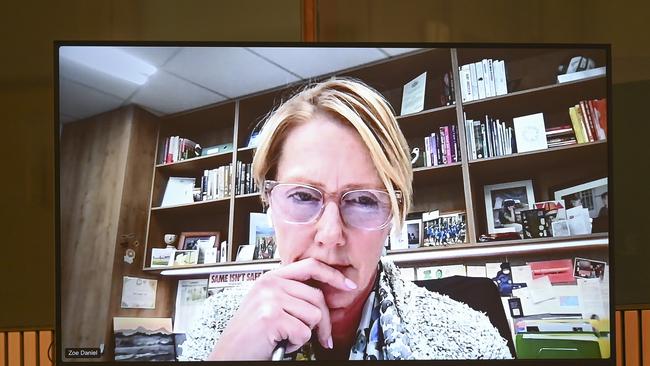
“They can also verify the age of their teen when setting up their phone, negating the need for everyone, adults and teens alike, to verify their age multiple times across multiple apps.”
Independent MP Zoe Daniels asked whether this approach was “shirking responsibility for age verification or safety”.
“So you will support some level of age assurance or age verification, as long as you don’t have to do it yourselves. Is that what it comes down to?
Ms Davis disagreed, arguing it was “very hard” for parents to stay across every app used by their children.

Ms Davis disagreed app store age verification would “shift the liability” away from social media platforms.
“We already hold … liability in relation to being, knowing that someone is underage and continuing to provide our service. So we’re not trying to shift that,” she said.
META PROVIDES UPDATE ON AGE VERIFICATION TRIAL
Meta executives also confirmed they had yet to be told of the next steps in the government’s age verification trial for online pornography and social media.
Ms Garlick said Meta had “engaged in some initial conversations” in which the company shared details on it’s existing age assuarance tools.
Ms Davis added that they had not been asked to “initiate that trial,” but doubled down and said Meta already implemented “age assurance measures,” and would continue doing so, regardless of the trial.
Asked if Ms Davis was essentially in “favour of federal legislation on age verification,” she clarified she wasn’t in support of all forms of age assurance.
“What we’re trying to do is to support an age assurance mechanism that is less privacy intrusive and simpler for parents, and also helps enable parents to approve an app download,” she said.
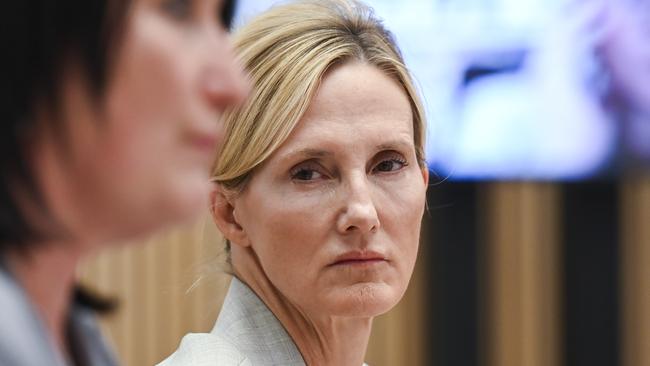
She said app stores were “gatekeepers” of the apps, which meant those platforms were better positioned to execute age verification, not social media companies themselves.
“The online operating system is the gatekeeper for these apps, and they have this information,” she said.
Ms Davis said making social media platform companies responsible would place a “tremendous burden on regulators”.
“I still think it creates that lack of simplicity for parents and really doesn’t empower parents in the way that the industry should,” she said.
“We’re not suggesting that there shouldn’t be additional efforts made by companies to assure age.
“We’re not suggesting that at all, and in fact in the legislation that we’re proposing, we want to ensure that there are obligations for apps to then provide age appropriate experiences and to create standards that are uniform across industry.”
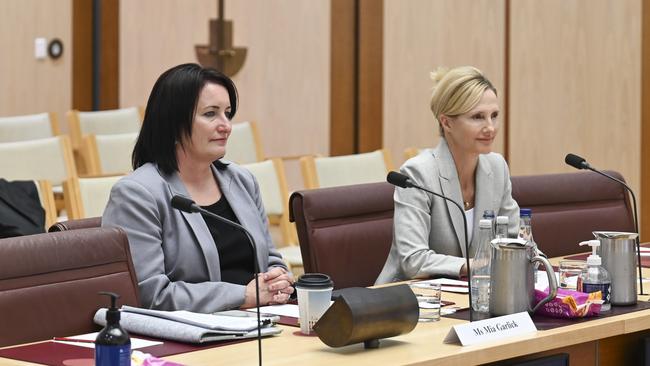
ATTENTION TURNS TO SCAM ADS
Ms Garlick has conceded Meta does receive revenue from scammers who use its platform’s targets ads process to identify vulnerable groups, such as people over 65, Indigenous Australians and people living in remote areas.
“So if a person creates an ad on the platform, they have access to the publicly available ad creation flow, than yes, that would include being able to target to over 65,” she said.
However she said Meta was increasing investment into how the platform tries to identify the scams.
She said while the company did receive money from scammers, there was “also significant cost in us trying to identify and thwart this”.
Despite this, Ms Garlick was unable to say the amount of revenue Meta had made from scam social media ads made by scammers, but she rejected assertions the company was profiting off the illegal activity.
“I think I can quite confidently say we’re not profiting, given the amount of work that is involved in trying to stay a step ahead of this adversarial space,” she said.
“That’s a very sizeable investment that we’re doing to try to combat that, given there are dedicated malicious actors that are operating across a range of different industries and a range of different platforms and a range of different countries to perpetrate these scams.”
Ms Garlick said Meta only played one part in the “scam attack chain,” and said the “completion of the scam does not happen on our services”.
She also confirmed that while victims can “seek reimbursement, where there was a concern around how their ad account or credit card was used when it’s connected to our platform,” scams often happen off-platform.
However Labor MP Susan Templeman didn’t accept her answer.
“So essentially, Meta is happy to register the users who place the scam ads. You approve the scam ads. Meta enables them to use the tools to target, particularly vulnerable Australians,” she said.
“Along the way, you’re profiting from those scam ads, even when they’ve been taken down, and essentially taking their money but leaving Meta users who’ve lost money. Your responsibility does not extend to them,” she said.
WHAT DID META SAY IN JUNE?
Ms Garlick and Ms Davis first appeared before the committee in June.
At the time, Ms Garlick wouldn’t confirm whether Meta would ban links to news sites on Facebook, as it has done in Canada, saying “all options are on the table”.
“We have made that announcement that we are deprecating the Facebook news product … we are still paying out the deals that supported that product,” Ms Garlick said at her original appearance in June.
“We haven’t had any indication from the government about any potential next steps and so I’m not in a position to be able to share more details about hypotheticals.”
The social media giant was accused of attempting to trial a news ban in August when Threads users were unable to share links to Australian news sites, however Meta said the issue had been caused by an error.
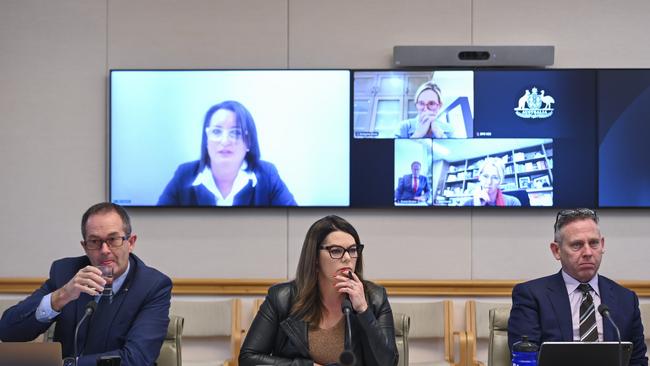
Ms Davis also caused outrage among committee members when she said she didn’t think social media harmed children.
“I think that social media has provided tremendous benefits,” she said at the time.
“I think that issues of teen mental health are complex and multifactorial. I think that it is our responsibility as a company to ensure that teens can take advantage of those benefits of social media in a safe and positive environment.”
The committee is expected to imminently release a more “substantial” interim update in the coming weeks, before it presents its final findings by November 18.
Speaking ahead of Wednesday’s inquiry, new committee chair Sharon Claydon, who took over after Labor MP Kate Thwaites was promoted to an assistant minister, said she would seek clarification and “interrogate Meta” on claims made in a hearing from June.
“Australians are increasingly concerned about the influence and impact of social media on so many areas of our society, including our mental health, wellbeing, safety and social cohesion,” the Labor MP said.
“I look forward to hearing from Meta about these issues, as well as exploring further the implications of their decision to abandon deals under the News Media Bargaining Code.”
Originally published as Top Meta execs to face grilling in social media probe



